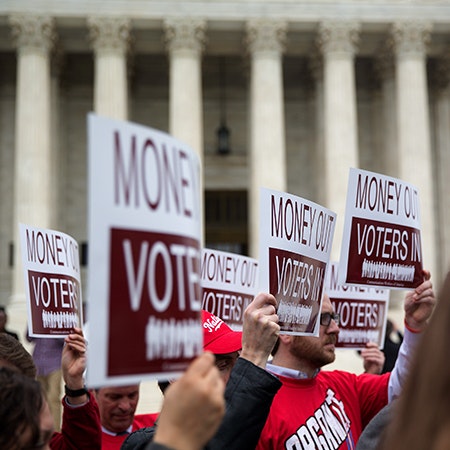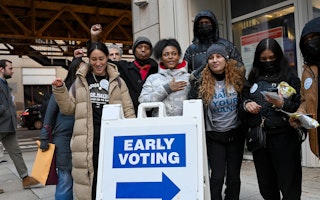Money and Politics in America: The View from Overseas
By Ivan Krastev

The U.S. Supreme Court’s ruling in McCutcheon v. FEC last week reminds me of the story of the boiled frog. The poor creature is coaxed into the water. Then the heat is turned up, little by little. Before long, the water’s boiling, the frog’s cooked—and he never saw it coming.
The Court is doing the same thing to democracy in the United States by allowing ever greater amounts of money to flow into its campaigns and elections. But watching from afar, it seems as though the American people, like the frog, don’t fully understand what’s happening. This showcase democracy is becoming less and less democratic before our very eyes, as the political system is handed over to oligarchs. This should be an occasion for outrage.
Fewer than 25 percent of Americans can claim to be millionaires. But this year, for the first time in history, a majority of their representatives in the U.S. House and Senate had a net worth of $1 million or more, according to a study by the Center for Responsive Politics. A candidate’s chances of winning are heavily influenced by how much money he or she has on hand; indeed, their bankroll often generates more coverage in the media than their views on the issues. And now, millionaires can give as much as they want to influence the vote.
In parts of Europe, there is state funding of political parties. This has made it possible for people who do not have millions, or friends with millions, to run for public office. But in the United States today, if you don’t have access to that kind of money, you won’t bother to run. From an overseas perspective, it seems you could organize a revolution, and it would probably be cheaper than winning an election. When organizing a revolution is cheaper than winning an election, something is very wrong.
The very definition of an oligarch is a person who’s using his money to invest in politics in order to make more money. The Supreme Court has now declared this legal. Under the ruling, one could spend $10 billion to support a candidate who insists that people who have $10 billion should not have to pay taxes.
This will take a toll on an already disillusioned electorate. The people who seem least interested in voting (and this is true throughout the West) are the young, the unemployed, the poor—the people you would normally believe have the most to gain from the political system. But people stop believing that elections have anything to do with the representation of their interests when all that money flows in; then, it’s just about the big donors.
The Court—the most isolated branch of government—is delegitimizing the power of the people. In a way, politics has become a business open only to millionaires, who run to become billionaires.
Why do people tolerate this? A survey I saw recently reveals that the overwhelming majority of Americans want to see the influence of money in politics curbed. But the overwhelming majority also believes that nothing will be done to address the problem. It strikes me as downright un-American to lose all hope for change.
Ivan Krastev is a member of the Open Society Global Board.


